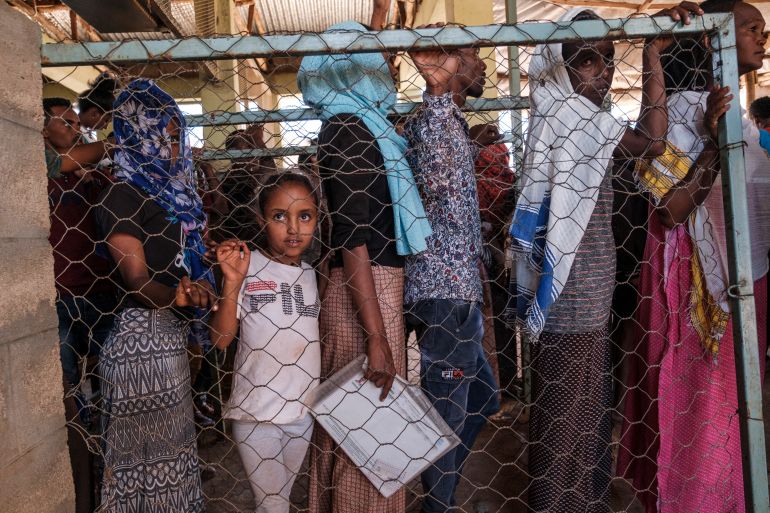UN warns situation in Ethiopia’s Tigray now ‘extremely alarming’
UN says most of the troubled region remains ‘inaccessible’ for aid workers amid growing hunger due to ongoing fighting.

Life for civilians in Ethiopia’s embattled Tigray region has become “extremely alarming and continues to deteriorate rapidly” as hunger grows and fighting remains an obstacle to aid reaching millions of people, the United Nations has said.
The UN said in a new report released on Thursday that access to essential services, food, water and livelihoods remain disrupted in large swaths of the troubled region.
Keep reading
list of 3 itemsSudan warns Ethiopia against second filling of dam without deal
Ethiopia: UN says 20,000 refugees missing in Tigray
The conflict has shaken one of Africa’s most powerful and populous countries, leaving thousands of people dead and causing some 950,000 to flee their homes.
But little is known about the situation for most of Tigray’s six million people, as journalists are blocked from entering, communications are patchy and many aid workers struggle to obtain permission to enter.
Prime Minister Abiy Ahmed ordered troops into the northern region on November 4, saying the operation was in response to alleged attacks on federal army camps by the Tigray People’s Liberation Front (TPLF), the regional governing party.
While the TPLF has withdrawn from the regional capital, Mekelle, and other big cities, low-level fighting has continued.
‘Volatile and unpredictable’
The UN report included a map showing most of the Tigray region marked as “inaccessible” for humanitarian workers. It says the security situation remains “volatile and unpredictable” more than two months after Abiy’s government declared victory.
The aid response remains “drastically inadequate” with little access to the vast rural population off the main roads, the report says, even as Ethiopia’s government has said more than one million people in Tigray have been reached with assistance.
Some aid workers have reported having to negotiate access with a range of armed groups, including Eritrean ones.
The UN reported that only 1 percent of the nearly 920 nutrition treatment facilities in Tigray are reachable.
“Reports from aid workers on the ground indicate a rising in acute malnutrition across the region,” it said.
A report on Thursday by the Famine Early Warning Systems Network, which is funded and managed by the United States, said starvation is a major concern in Tigray.
“Many households are expected to have already depleted their food stocks, or are expected to deplete their food stocks in the next two months,” it said.
On Thursday, US Secretary of State Antony Blinken urged the 2019 Nobel Peace Prize winner Abiy in a phone call to allow “immediate, full and unhindered” aid access to Tigray before more people die.
‘Extremely grave’
Visiting UN refugee chief Filippo Grandi this week urged Ethiopia to allow access for independent investigators to probe alleged widespread human rights abuses, calling the overall situation in Tigray “extremely grave”.
Speaking to reporters on Monday in the country’s capital Addis Ababa, Grandi said that, although “some progress” in the security situation had been made by the government, “in some areas we continue to observe violence carried out by various armed elements and militias” which has resulted in looting, violence, sexual violence, and rape.
On Wednesday, UN aid chief Mark Lowcock told the Security Council there were reports of increasing insecurity elsewhere in Ethiopia, which could be due to a vacuum created by the redeployment of Ethiopian troops to Tigray, and that the UN was concerned about the potential for broader national and regional destabilisation.